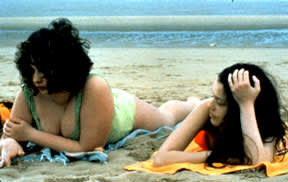Yes, Fat Girl does contain scenes of graphic sex. They aren't steamy, they are sad, and the most shocking thing about them is the accurate portrayal of how a charming, opportunistic man can manipulate an inexperienced girl.
Catherine Breillat's tale of adolescent anguish is shot with a bleaching light that is antithetical to a sunny vacation in southern France. Contradictory too are the film's divergent viewpoints, which result in an unsettling blend of gothic melodrama and almost documentary realism. This lends the film both the specific sympathy necessary to the characters and the overarching thematic power of drama.
Anais, the "fat girl" of the film's title, is played with sullen discomfort by Anais Reboux. Reboux is gutsy in her role, which includes much courageous exposure of her own flesh. Roxane Mesqida, Anais's sister Elena, is adept at showing the bored haughtiness so prevalent at 15 for all things familiar and familial. Still, she successfully conveys the insecurity and anger that lies beneath. As her seducer, Fernando (Libero de Rienzo) is so charming that we can easily see how he lets himself be caught up in his lies along with Elena.
The parents' roles are short, contributing to our sense that they are not aware of what is happening in their daughters' lives. Arsinee Khanjian is a mother of smug oblivion, while Romain Goupil injects some humour into the role of a work-obsessed father who is bombastic in his displays of how much stress his sacrifices create. Such parents make it possible to believe that Fernando could spend the night in the sisters' room undetected, except of course by Anais, who is forced into an uncomfortable complicity with the young lovers. The secrecy accentuates the sibling rivalry between the girls and their heightened emotions create a palpable sense of doom that escalates until a dramatic scene of revelation.
More suspense follows in this film of sadness and horror, which is a consummate piece of cinematic writing and realisation.
Catherine Breillat's tale of adolescent anguish is shot with a bleaching light that is antithetical to a sunny vacation in southern France. Contradictory too are the film's divergent viewpoints, which result in an unsettling blend of gothic melodrama and almost documentary realism. This lends the film both the specific sympathy necessary to the characters and the overarching thematic power of drama.
Anais, the "fat girl" of the film's title, is played with sullen discomfort by Anais Reboux. Reboux is gutsy in her role, which includes much courageous exposure of her own flesh. Roxane Mesqida, Anais's sister Elena, is adept at showing the bored haughtiness so prevalent at 15 for all things familiar and familial. Still, she successfully conveys the insecurity and anger that lies beneath. As her seducer, Fernando (Libero de Rienzo) is so charming that we can easily see how he lets himself be caught up in his lies along with Elena.
The parents' roles are short, contributing to our sense that they are not aware of what is happening in their daughters' lives. Arsinee Khanjian is a mother of smug oblivion, while Romain Goupil injects some humour into the role of a work-obsessed father who is bombastic in his displays of how much stress his sacrifices create. Such parents make it possible to believe that Fernando could spend the night in the sisters' room undetected, except of course by Anais, who is forced into an uncomfortable complicity with the young lovers. The secrecy accentuates the sibling rivalry between the girls and their heightened emotions create a palpable sense of doom that escalates until a dramatic scene of revelation.
More suspense follows in this film of sadness and horror, which is a consummate piece of cinematic writing and realisation.
